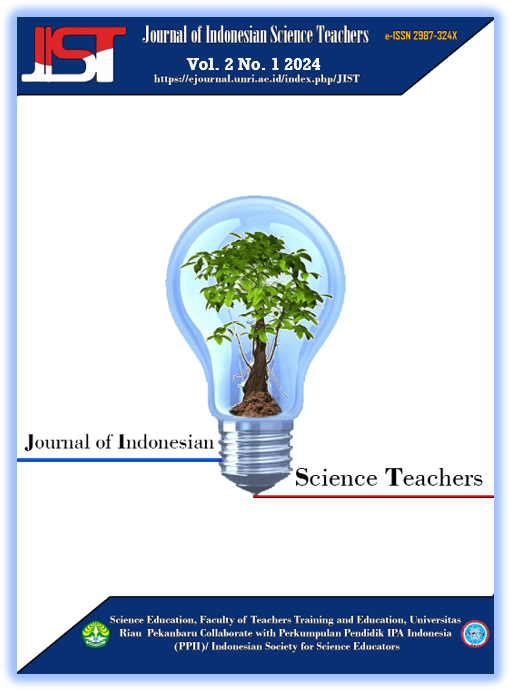The Effect of Kelong-Oriented Contextual Approach on the Cognitive Science Learning Outcomes
Kata Kunci:
cognitive learning outcomes, contextua, kelong, science learningAbstrak
This research aims to improve students' cognitive learning outcomes by using a contextual approach oriented towards traditional kelong fishing gear. This research method uses a quasi-experiment with a non-equivalent post-test only group design. The population in this study was class VIII students, totaling 79 people. The population came from three classes, of which 2 classes were then selected for the research sample, namely class VIII-1 as the experimental group and class VIII-2 as the control group. The research was carried out in four meetings. After learning is complete, students are given a posttest in the form of a cognitive learning outcomes test instrument with 25 multiple-choice questions. The average score data on student learning outcomes shows differences between the experimental class and the control class. The experimental class obtained an average score of 72.90 in the good category, while the control class obtained an average score of 59.37 in the quite good category. Then, based on the independent sample T-Test, the significance results were 0.000 < 0.05. Therefore, learning with a contextual approach oriented towards traditional kelong fishing gear is effectively used to improve cognitive science learning outcomes for students at SMPN 1 Lingga Utara.
Referensi
Andirani, A. (2018). Saya Indonesia, Negara Maritim Jati Diri Negaraku. CV Jejak.
Asrizal, A., Amran, A., Ananda, A., & Festiyed, F. (2018). Effectiveness of adaptive contextual learning model of integrated science by integrating digital age literacy on grade VIII students. IOP Conference Series: Materials Science and Engineering, 335, 012067. https://doi.org/10.1088/1757-899X/335/1/012067
Baskoro, M. S., & Yusfiandani, R. (2018). Metode penangkapan ikan. IPB Press.
Chen, K., & Chen, C. (2021). Effects of STEM inquiry method on learning attitude and creativity. Eurasia Journal of Mathematics, Science and Technology Education, 17(11), em2031. https://doi.org/10.29333/ejmste/11254
Fauziana, Fani, K., & Rahmiaty. (2021). Analisis kemampuan siswa dalam menyelesaikan soal HOTS pada pelajaran IPA. Genderang Asa: Journal of Primary Education, 2(2), 66–75. https://doi.org/10.47766/ga.v2i2.165
Gumisirizah, N., Muwonge, C. M., & Nzabahimana, J. (2024). Boosting learning achievement in physics among ugandan form-2 students: effect of problem-based learning. Physics Education, 59(1), 015006. https://doi.org/10.1088/1361-6552/acfebb
Inayatusufi, C., El Hakim, L., & Sari, P. (2020). Peningkatan kemampuan pemahaman konsep matematis melalui model kooperatif tipe scramble dengan pendekatan kontekstual pada materi segiempat dan segitiga di Kelas VII. Jurnal Riset Pendidikan Matematika Jakarta, 2, 28–37. https://journal.unj.ac.id/unj/index.php/jrpmj/article/view/15118
Kemendikbud. (2019). Laporan hasil ujian nasional tahun pelajaran 2018/2019.
Kusdiantoro, K., Fahrudin, A., Wisudo, S. H., & Juanda, B. (2019). Perikanan tangkap di indonesia: potret dan tantangan keberlanjutannya. Jurnal Sosial Ekonomi Kelautan Dan Perikanan, 14(2), 145. https://doi.org/10.15578/jsekp.v14i2.8056
OECD. (2023). Programme for international student assesment (PISA).
Prayunisa, F., & Marzuki, A. D. (2023). Analisis kesulitan guru ipa dalam pembelajaran IPA di SMP dan SD. NUSRA: Jurnal Penelitian Dan Ilmu Pendidikan, 4(2), 268–275. https://doi.org/10.55681/nusra.v4i2.894
Sekarini, R. P., & Arty, I. S. (2019). Contextual-based science outdoor learning to improve student curiosity. Journal of Physics: Conference Series, 1233, 012103. https://doi.org/10.1088/1742-6596/1233/1/012103
Sudirman. (2013). Mengenal alat dan metode penangkapan ikan. Rineka Cipta.
Sudirman, A. M. (2012). Teknik penangakapan ikan. Rineka Cipta.
Taufik, M. A., Mulyoto, Sunardi, & Suryani, N. (2019). The effectiveness of mathematic learning materials based on contextual teaching and learning. Journal of Physics: Conference Series, 1339(1), 012133. https://doi.org/10.1088/1742-6596/1339/1/012133
Wahyuniati. (2013). Penggunaan Model konvensional untuk meningkatkan kemampuan menulis narasi siswa. Universitas Muhammadiyah Purwokerto.
Widiastuti, N. L. G. K. (2021). E-modul dengan pendekatan kontekstual pada mata pelajaran IPA. Jurnal Imiah Pendidikan Dan Pembelajaran, 5(3), 435. https://doi.org/10.23887/jipp.v5i3.37974
Yussuwadinata, Z. A. K. (1992). Upacara tradisional mendirikan kelong bagi masyarakat melayu di Kabupaten Tingkat II Kepulauan Riau. Departemen Pendidikan dan Kebudayaan.
Zubaidah, S., Mahanal, Susriyati, Yuliati, Lia, dkk. (2017). Ilmu pengetahuan alam. Kemendikbud.






